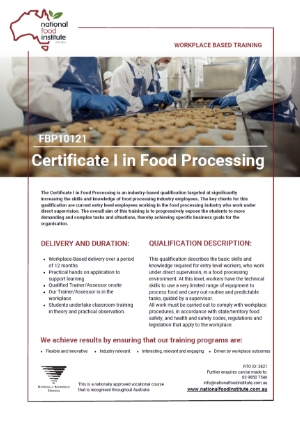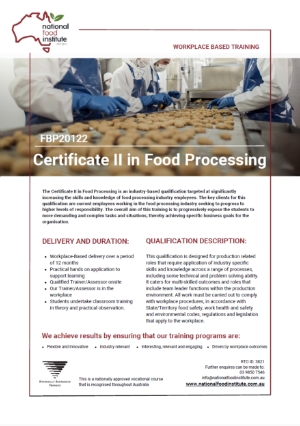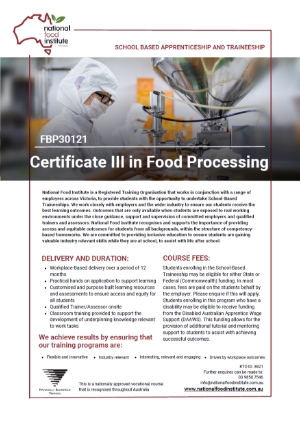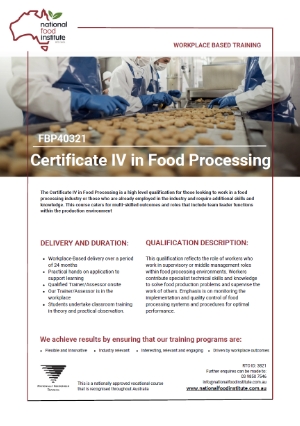Food Processing

Courses

 Certificate I in Food Processing
Certificate I in Food Processing
FBP10121 Certificate I in Food Processing provides the basic skills and knowledge required for entry level workers in the food processing industries for a range of sectors.
-
Course Description This qualification describes the basic skills and knowledge required for entry level workers, who work under direct supervision, in a food processing environment. At this level, workers have the technical skills to use a very limited range of equipment to process food and carry out routine and predictable tasks, guided by a supervisor.
All work must be carried out to comply with workplace procedures, in accordance with state/territory food safety, and health and safety codes, regulations and legislation that apply to the workplace.
-
Entry Requirements There are no set prerequisites for this course.
All students wishing to enrol in this course are required to demonstrate an interest in, knowledge of, and suitability for work in the industry, undertake a pre-training review and study skills assessment to determine language, literacy and numeracy levels to allow us to adequately support each student throughout their studies and to ensure only the most suitable and appropriate course if recommended.
-
Training & Assessment This course is delivered in the workplace by experienced industry current trainers and assessors.
Students are provided with engaging content, practical demonstrations and real life work experiences to ensure that once student successfully completes this course, they are job ready.
Student competency is determined using a range of assessment tools, including:
- Written and verbal questions
- Practical observations by qualified assessor
- Projects
- Supervisors report
-
Recognition of Prior Learning (RPL) and Credit Transfer (CT) RPL is a process where a student may be granted credit or partial credit towards a qualification in recognition of skills and knowledge gained through work experience, life experience and/or formal training.
National Food Institute offers all students the opportunity to apply for Skills Recognition at enrolment in the course.
CT is a process where a student is given credit toward their course for units of competency they have already achieved.
-
Pathways Pathways into the qualification
The pathway for candidates considering this qualification is direct entry.
Pathways from the qualification
Successful completion of this course may enable students to enter the entry level food processing workforce or continue with their studies by enrolling in FBP20122 Food Processing or another, more suitable food processing qualification.
-
Duration This course may take up to 12 months to complete.
The actual duration is dependent on rate of completion by each student.
AQF guidelines state a Certificate I qualification should be delivered over 0.5 to 1 year. Our delivery of this course may take up to 12 months to complete but can vary student to student due to their individual progress.
-
Course Structure FBP20122 Certificate I in Food Processing requires successful completion of 9 units of competency, 5 core units plus 4 elective units.
Core Units of Competency
- FBPFSY1002 Follow work procedures to maintain food safety
- FBPOPR1017 Follow work procedures to maintain quality
- FBPOPR2074 Carry out manual handling tasks
- FBPPPL1001 Communicate workplace information
- FBPWHS1001 Identify safe work practices
Elective Units of Competency
- FBPOPR1013 Operate basic equipment
- FBPOPR2069 Use numerical applications in the workplace
- MSMENV272 Participate in environmentally sustainable work practices
- FBPPPL2002 Work in a socially diverse environment
At National Food Institute, we pride ourselves on providing relevant training to each student and where required, other elective units of competency may be selected by the student.
Our experienced trainer will discuss student needs with each student to determine what units are most relevant and an individual training plan will be developed.

 Certificate II in Food Processing
Certificate II in Food Processing
FBP20122 Certificate II in Food Processing is an entry level qualification for those looking to work in a food processing industry.
-
Course Description This qualification describes the skills and knowledge required for those who work in operational roles, under supervision, in a food processing environment. At this level, workers have the technical skills to use a limited range of machinery and/or equipment to process food and carry out routine tasks guided by established procedures.
Dependant on where you live, training may be subsidised and this is acknowledged below:
Victoria – this training is delivered with Victorian and Commonwealth Government Funding.
NSW – this training is subsidised by the NSW Government.
Please complete an 'Enquire now' request in our Contact section as to the support available in other states. -
Entry Requirements There are no set prerequisites for this course.
All students wishing to enrol in this course are required to demonstrate an interest in, knowledge of, and suitability for work in the industry, undertake a pre-training review and study skills assessment to determine language, literacy and numeracy levels to allow us to adequately support each student throughout their studies and to ensure only the most suitable and appropriate course if recommended.
-
Training & Assessment This course is delivered in the workplace by experienced industry current trainers and assessors.
Students are provided with engaging content, practical demonstrations and real life work experiences to ensure that once student successfully completes this course, they are job ready.
Students competency is determined using a range of assessment tools, including:
- Written and verbal questions
- Practical observations by qualified assessor
- Projects
- Supervisors report
-
Recognition of Prior Learning (RPL) and Credit Transfer (CT) RPL is a process where a student may be granted credit or partial credit towards a qualification in recognition of skills and knowledge gained through work experience, life experience and/or formal training.
National Food Institute offers all students the opportunity to apply for Skills Recognition at enrolment in the course.
CT is a process where a student is given credit toward their course for units of competency they have already achieved.
-
Pathways Pathways for candidates considering this qualification include:
- FBP10121 Certificate I in Food Processing
- Direct entry
- limited vocational training and/or work experience
Pathways from the qualification
Successful completion of this course may enable students to enter the entry level food processing workforce or continue with their studies by enrolling in FBP30121 Certificate III in Food Processing or another, more suitable, food processing qualification.
-
Duration This course may take up to 12 months to complete.
The actual duration is dependent on rate of completion by each student.
AQF guidelines state a Certificate II qualification should be delivered over 0.5 to 1 year. Our delivery of this course may take up to 12 months to complete but can vary student to student due to their individual progress.
-
Course Structure FBP20122 Certificate II in Food Processing requires successful completion of 13 units of competency, 4 core units plus 9 elective units.
Core Units
- FBPFSY2002 Apply food safety procedures
- FBPOPR2071 Provide and apply workplace information
- FBPOPR2096 Follow procedures to maintain good manufacturing practice in food processing
- FBPWHS2001 Participate in work health and safety processes
Electives Units
- FBPOPR2079 Work with temperature controlled stock
- FBPPPL1001 Communicate workplace information
- FBPRBK3009 Produce biscuit and cookie products
- FBPOPR1017 Follow work procedures to maintain quality
- FBPOPR2070 Apply quality systems and procedures
- FBPOPR2076 Inspect and sort materials and product
- FBPPPL2001 Participate in work teams and groups
- FBPPPL2002 Work in a socially diverse environment
- FBPOPR2074 Carry out manual handling tasks
Elective units are examples only and may change subject to client need and job outcome.
At National Food Institute, we proud ourselves on providing relevant training to each student and where required, other elective units of competency may be selected by the student.
Our experienced trainer will discuss student needs with each student to determine what units are most relevant and an individual training plan will be developed.

 Certificate III in Food Processing
Certificate III in Food Processing
FBP30121 Certificate III in Food Processing is a mid-level qualification for those looking to work in a food processing industry or those who are already employed in the industry and require additional skills and knowledge. This course caters for multi-skilled outcomes and roles that include team leader functions within the production environment.
-
Course Description This qualification reflects the role of individuals working as operators in a food processing environment who have responsibility for overseeing all or part of a processing plant and related equipment. They are required to work autonomously, use judgement, interpret information, and apply solutions to routine and some non-routine problems. They may also take some responsibility for the output of others.
This qualification offers specialisations in:
- Bottling and Packaging
- Brewing
- Confectionery
- Dairy Processing (cheese, powder and/or milk)
- Distilling
- Edible Oils (refining or cold pressing edible oils)
- Milling
- Non-alcoholic Beverages (fruit juice, cordial)
- Pet Food (companion animals)
- Quality (for operator roles)
- Sales
- Stock Feed (cattle, horses, sheep, pigs, poultry, fish – animals that produce for human consumption)
Dependant on where you live, training may be subsidised and this is acknowledged below:
Victoria – this training is delivered with Victorian and Commonwealth Government Funding.
NSW – this training is subsidised by the NSW Government.
Please complete an 'Enquire now' request in our Contact section as to the support available in other states. -
Entry Requirements There are no set prerequisites for this course.
All students wishing to enrol in this course are required to demonstrate an interest in, knowledge of, and suitability for work in the industry, undertake a pre-training review and study skills assessment to determine language, literacy and numeracy levels to allow us to adequately support each student throughout their studies and to ensure only the most suitable and appropriate course if recommended.
-
Training & Assessment This course is delivered in the workplace by experienced industry current trainers and assessors and may be undertaken as part of a Traineeship.
Students are provided with engaging content, practical demonstrations and real life work experiences to ensure that once student successfully completes this course, they are job ready.
Student competency is determined using a range of assessment tools, including:
- Written and verbal questions
- Practical observations by qualified assessor
- Projects
- Supervisors report
-
Recognition of Prior Learning (RPL) and Credit Transfer (CT) RPL is a process where a student may be granted credit or partial credit towards a qualification in recognition of skills and knowledge gained through work experience, life experience and/or formal training.
National Food Institute offers all students the opportunity to apply for Skills Recognition at enrolment in the course.
CT is a process where a student is given credit toward their course for units of competency they have already achieved.
-
Pathways Pathway into the qualification
Pathways into the qualification Pathways for candidates considering this qualification include:
- FBP20122 Certificate II in Food Processing
- Direct entry
- Relevant vocational training and/or work experience
Pathway from the qualification
After achieving this qualification, students may undertake the FBP40321 Certificate IV in Food Processing or other food processing related qualifications or any other suitable qualification.
-
Duration This course may take up to 24 months to complete.
The actual duration is dependent on rate of completion by each student and specific program requirements.
AQF guidelines state a Certificate III qualification should be delivered over 1 to 2 years. Our delivery of this course may take up to 24 months to complete but can vary student to student due to their individual progress.
-
Course Structure FBP30121 Certificate III in Food Processing requires successful completion of 17 units of competency, 5 core units plus 12 elective units.
Core Units of Competency
- FBPFSY3003 Monitor the implementation of food safety and quality programs
- FBPFSY3004 Participate in traceability activities
- FBPOPR3019 Operate and monitor interrelated processes in a production or packaging system
- FBPOPR3021 Apply good manufacturing practice requirements in food processing
- FBPWHS3001 Contribute to work health and safety processes
Elective Units of Competency
- FBPOPR2089 Operate a production process
- FDFOHS2001A Participate in OHS processes
- FSKLRG009 Use strategies to respond to routine workplace problems
- HLTWHS005 Conduct manual tasks safely
- FSKRDG009 Read and respond to routine standard operating procedures
- BSBPEF301 Organise personal work priorities
- FBPOPR2069 Use numerical applications in the workplace
- FSKNUM015 Estimate, measure and calculate with routine metric measurements for work
- FBPOPR3004 Set up a production or packaging line for operation
- FBPPPL3006 Report on workplace performance
- FBPPPL3003 Participate in improvement processes
- MSS402080 Undertake root cause analysis
- FBPFSY3005 Control contaminants and allergens in food processing
Elective Units selected are examples only and are subject to client preference job outcomes.
At National Food Institute, we pride ourselves on providing relevant training to each student and where required, other elective units of competency may be selected by the student.
Our experienced trainer will discuss student needs with each student to determine what units are most relevant and an individual training plan will be developed.

 Certificate IV in Food Processing
Certificate IV in Food Processing
FBP40321 Certificate IV in Food Processing is a high level qualification for those looking to work in a food processing industry or those who are already employed in the industry and require additional skills and knowledge. This course caters for multi-skilled outcomes and roles that include team leader functions within the production environment.
-
Course Description This qualification reflects the role of workers who work in supervisory or middle management roles within food processing environments. Workers contribute specialist technical skills and knowledge to solve food production problems and supervise the work of others. Emphasis is on monitoring the implementation and quality control of food processing systems and procedures for optimal performance.
Dependant on where you live, training may be subsidised and this is acknowledged below:
Victoria – this training is delivered with Victorian and Commonwealth Government Funding.
NSW – this training is subsidised by the NSW Government.
Please complete an 'Enquire now' request in our Contact section as to the support available in other states. -
Entry Requirements There are no set prerequisites for this course.
All students wishing to enrol in this course are required to demonstrate an interest in, knowledge of, and suitability for work in the industry, undertake a pre-training review and study skills assessment to determine language, literacy and numeracy levels to allow us to adequately support each student throughout their studies and to ensure only the most suitable and appropriate course if recommended.
-
Training & Assessment This course is delivered in the workplace by experienced industry current trainers and assessors and may be undertaken as part of a Traineeship.
Students are provided with engaging content, practical demonstrations and real life work experiences to ensure that once student successfully completes this course, they are job ready.
Student competency is determined using a range of assessment tools, including:
- Written and verbal questions
- Practical observations by qualified assessor
- Projects
- Supervisors report
-
Recognition of Prior Learning (RPL) and Credit Transfer (CT) RPL is a process where a student may be granted credit or partial credit towards a qualification in recognition of skills and knowledge gained through work experience, life experience and/or formal training.
National Food Institute offers all students the opportunity to apply for Skills Recognition at enrolment in the course.
CT is a process where a student is given credit toward their course for units of competency they have already achieved.
-
Pathways Pathway into the qualification
Pathways into the qualification Pathways for candidates considering this qualification include:
- FBP30121 Certificate II in Food Processing
- Relevant vocational training and/or work experience
Pathway from the qualification
After achieving this qualification, students may undertake a diploma level qualification in the food, beverage and pharmaceutical sector, or another relevant sector.
-
Duration This course may take up to 24 months to complete.
The actual duration is dependent on rate of completion by each student and specific program requirements.
-
Course Structure FBP40321 Certificate IV in Food Processing requires successful completion of 20 units of competency, 8 core units plus 12 elective units.
Core Units of Competency
- BSBLDR412 Communicate effectively as a workplace leader
- BSBPMG430 Undertake project work
- BSBOPS403 Apply business risk management processes
- BSBWHS411 Implement and monitor WHS policies, procedures and programs
- FBPFSY4001 Supervise and maintain a food safety plan
- FBPTEC4003 Control food contamination and spoilage
- FBPTEC4007 Describe and analyse data using mathematical principles
- MSMENV472 Implement and monitor environmentally sustainable work practices
Elective Units of Competency
- BSBLDR411 Demonstrate leadership in the workplace
- BSBLDR413 Lead effective workplace relationships
- BSBXCM401 Apply communication strategies in the workplace
- BSBXTW401 Lead and facilitate a team
- BSBPEF401 Manage personal health and wellbeing
- BSBPEF402 Develop personal work priorities
- FBPPPL3003 Participate in improvement processes
- MSMSUP390 Use structured problem-solving tools
- FBPPPL3007 Support and mentor individuals and groups
- FBPPPL4001 Manage people in the work area
- TAEDEL301 Provide work skill instruction
- FBPPPL4006 Manage a work area within budget
Elective Units selected are examples only and are subject to client preference job outcomes.
At National Food Institute, we pride ourselves on providing relevant training to each student and where required, other elective units of competency may be selected by the student.
Our experienced trainer will discuss student needs with each student to determine what units are most relevant and an individual training plan will be developed.
